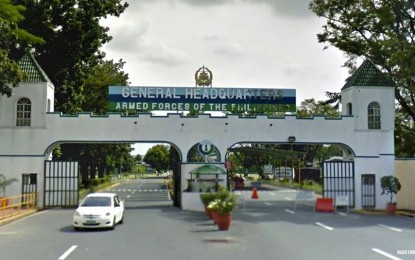
(File photo)
MANILA – President Rodrigo Roa Duterte has signed a new law that sets the term of the chief of staff and other senior military officers holding key positions in the Armed Forces of the Philippines (AFP) to three years.
Republic Act 11709, signed by Duterte on April 13, sets a fixed three-year tour of duty for the AFP chief of staff, vice chief of staff, the deputy chief of staff, the major service commanders (Philippine Army, Philippine Air Force, Philippine Navy), unified command commanders, and inspector general "unless sooner terminated by the President."
Under the law, the President may extend the tour of duty "in times of war or other national emergency declared by Congress."
The new law also provides a tour of duty of four years for the superintendent of the Philippine Military Academy (PMA) “unless sooner terminated by higher authority.”
Except for the position of chief of staff, the PMA superintendent will not be eligible for any other position in the AFP and will be compulsorily retired after completion of the fixed tour of duty or upon relief from office.
No general/flag officer who is more than 58 years of age will be appointed as PMA superintendent.
The law sets to 56 or the accumulation of 30 years of satisfactory active duty, whatever is later for those in the grades of second lieutenant/ensign (0-1) to colonel/captain (0-6).
It also sets to 59 or the maximum tenure-in-grade as defined in this act, whichever comes earlier, those in the grades of brigadier general/commodore (0-7) to lieutenant general/vice-admiral (0-9).
RA 11709 prohibits a retired or resigned military officer from being appointed as Secretary of National Defense within one year from the date of the officer's retirement or resignation.
The law is expected to enhance professionalization in the organization by strengthening the merit system, allowing the new leadership a longer period to implement reforms, and institutionalize sound policies that will redound to the improvement of the AFP.
It also aims to promote the most qualified officers to higher ranks; obviate revolving door accommodation promotions to successfully create a new culture of excellence in leadership and accountability in the AFP, and refine and improve the rules on retirement and commissionship.
Law to bring stability
The AFP also welcomed Duterte’s approval of the prescribed three-year fixed terms for key military officials.
"The AFP is confident that the newly-signed law will bring stability in the military organization as we continue to fulfil our mandate as protectors of the people and the state," AFP spokesperson Army Col. Ramon Zagala said in a statement.
He added that the AFP is very grateful for the support of the administration as well as the Senate and the House of Representatives in ensuring the continuity of its programs and operations.
"This shall make the AFP a more efficient and effective organization and will contribute to the realization of our vision of a more credible Armed Forces which is a source of national pride," Zagala said.
‘Game changer’
Muntinlupa Rep. Ruffy Biazon said the new law is a "game-changer" as it will enhance stability in the leadership and provide a focused effort in developing the armed forces.
"I thank President (Rodrigo) Duterte for finally closing the revolving door that has long put the Armed Forces of the Philippines on constant short-term reset and making it prone to politicization due to the constant jostling for positions, especially at the higher ranks," Biazon said in a statement.
Biazon noted that the proposal has been pending for more than two decades, although it could have been passed into law in the 16th Congress had it not been vetoed by President Benigno Aquino III.
"I am thankful that after filing and refiling it since my first term in 2001, it has finally become a Republic Act. I see this bill as a game-changer for the AFP," he said.
The measure was passed by the House of Representatives as House Bill No. 10521 on Dec. 6, 2021 and adopted by the Senate as an amendment to Senate Bill No. 2376 on Jan. 17, 2022. (with reports from Filane Mikee Cervantes/Priam Nepomuceno/PNA)
